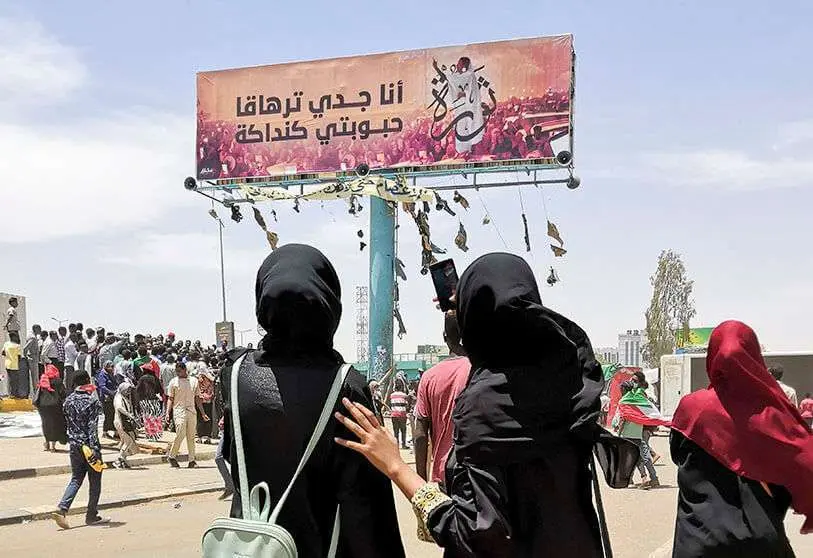Would hope come from Sudan?

It's been there for almost 30 years. Omar al-Bashir ruled Sudan with an iron fist. In 2018, social protests against the rise in the price of bread and other austerity measures decided by the government quickly turned into political protest.
The revolution breaks out, women take the lead and become the symbol of revolt and change. One of them stands out and leads the revolt. Her name is Alaa Salah, dressed in white, her silhouette is drawn on the walls, her slogans are taken up in chorus... she has become the icon of a generation, of a movement to the great consternation of power.
But to understand the scope of this situation, we must remember that in Sudan women can be arrested because they dance, because they live, because they have a body, because they meet men who are not members of their family. These freedom-destroying laws are inspired by the Sharia, that literal reading of the Koran that governs social relations.
Omar al-Bashir was forced to leave power and after a struggle between people and the army, a transitional government was established. Today, it is giving strong signals to the call in the streets and the demands of the people. The streets of Khartoum have once again become meeting places after being closed to its citizens.
The Sudanese people will remember this month of July 2020. The transitional government has announced a series of measures and laws that commit it to freedom and democracy.
The breakthrough in women's rights and respect for their physical integrity is probably as expected as the ban on genital mutilation. The Sovereign Council of Sudan had criminalized such barbaric acts and offenders could be sentenced to up to three years' imprisonment. For the record, former President Omar al-Bashir had opposed a bill in 2015 that was in line with this prohibition. Excision is an ancient practice that has ancient roots in Sudanese society and, contrary to what many believe, has nothing to do with Islam. It predates Islam and is considered a rite of passage. Today, Sudan seems to be looking to the future and, after several years of humiliation, injustice and inequality, the degrading nature of these laws is finally recognized.
Also in the area of women's rights, the law requiring Sudanese women to ask permission from their male relatives to travel with their children had been abolished.
In this stream of reforms and announcements, there is also the repeal of the law against apostasy. This repeal is, moreover, inscribed in the Koran, which clearly states that "there is no obligation in religion".
Prime Minister Abdalla Hamdok welcomed these reforms. He said in a tweet that it is not a question of "revenge, but of restoring dignity to the Sudanese people after years of tyranny". It is "the beginning of a new era in Sudan," he promised. Moreover, alcohol for Muslims remains a ban to the dismay of some.
In any case, a new Sudan is underway and the will to break with the old regime has been proclaimed many times. It is a time when "fundamental rights have been exploited, humiliated and violated". It has served to enslave [women] financially and psychologically. Many Sudanese women have suffered intolerable damage. I pay tribute to them," insisted the new prime minister.
Sudanese civil society has, of course, welcomed these new measures with relief and joy at a time when the trial of the former president is still under way (it has been postponed until August). Omar al-Bashir, who is appearing before his country's court on corruption charges, must also answer for the 1989 coup. In addition, he is accused of war crimes in the Darfur conflict and crimes against humanity. He is the subject of two international arrest warrants.
Sudanese Justice Minister Nasreddine Abdelbari has declared that "all laws contrary to human rights in Sudan will be abolished". This is a huge task in a country that has lived under an authoritarian regime and where some actors remain in power.
The road to democracy is long and full of pitfalls. The fragile balance between civilians and the army has not yet been found and risks being broken at any moment. The Army, which is ensuring the transition at the level of the Sovereign Council, is also known for its involvement in the massacres in Darfur.
The country's economic crisis, aggravated in recent months by the global health crisis, is also likely to weigh on the political balance.
Last June, the international community pledged $1.8 billion in aid to Khartoum. "We need a stable and democratic Sudan," said U.N. Secretary-General António Guterres. It is true that a strong Sudan will not be a luxury for the region, which is experiencing great political instability. But will this necessary support from the international community be validated by the Trump administration?
As a reminder, Sudan is on the US blacklist, accused of supporting terrorism, which blocks foreign investment in the country and keeps it in a precarious economic situation. Sudan is playing out its destiny today. Its battle has not yet been won, either nationally or internationally.

